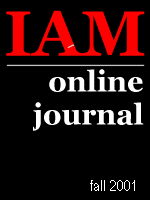
America’s $10 trillion economy is still functioning. Like a thick rubber band, it can be stretched in all directions. But once the pressure is released, it returns to its original shape.
September 11 yanked our economy in an unexpected way. It put pressure on specific sectors: airlines, aerospace, travel, insurance and financial institutions.
Economists estimate that the direct financial loss from the attacks exceeds $60 billion. That is a significant sum -- more than twice the economic losses attributed to the 1994 Los Angeles earthquake.
And yet, a loss of $60 billion represents less than 1 percent of our Gross National Product. Insurance will cover some losses. And the federal government will provide targeted economic relief.
So, why is Wall Street reeling? Why are corporate executives panicking?
The reason is this: The United
States was already in a recession. Agriculture, technology and manufacturing
sectors contracted for most of 2001.
Unemployment claims rose
each week. And only investment brokers and stock analysts projected a quick
rebound.
The route to prosperity does not run through the financial district of New York. It runs along the interstate highways, railroad tracks and flight paths that crisscross this nation. It runs past farms, industrial parks, technology centers and shopping malls. It runs through the neighborhoods of America’s working families.
If policy makers want the economy to grow again, then they must give those working families a raise. They have earned it. It was their productivity -- each family working 500 more hours a year than ten years ago -- that produced the economic miracle of the last decade. It was their “mandatory overtime” that kept entire industries running at or near maximum capacity.
It is time Americans got the real raises they deserve, directly or indirectly.
Raising everyone’s take-home
pay by one dollar an hour would pump about $3,700 into a working family’s
checking account. Speeding up next year’s planned tax cut to February 1
could add up to $600 more. And reducing the payroll tax by a half of one
percent would give them another $3,200 to spend.
A pay raise of $7,500 per
working family -- a little more than $2 per hour --
is not extravagant. It is absolutely necessary to snap the American economy
out of this recession.
And to do less, while pumping billions into corporations, easing interest rates for banks and adding liquidity to the stock markets, would be a travesty.
Previous Page/Contents/Next Page